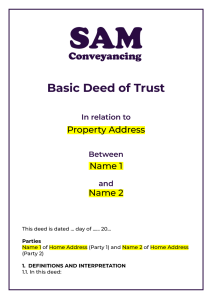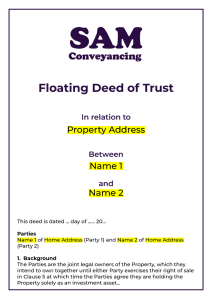Co-Ownership Agreement for Property
Unmarried and buying a home? You need a plan for the unthinkable. In England and Wales, if you buy a property with a partner, friend, or family member, the law offers almost no protection if your relationship ends. Forget the term 'common law marriage' - it’s a widespread myth.
For couples who split, there is no automatic right to an equal share, nor to the return of your initial investment. If you put in a larger deposit or are contributing unequally, your money is vulnerable.
That is why a Co-Ownership Agreement (Deed of Trust) is essential. It is the legal shield that ensures your property split, who gets what upon sale, is determined by what you agree now, not by a costly court battle later.
You will almost certainly hold the property as Tenants in Common, meaning each party holds a distinct, separate share. But crucially, without a formal agreement to define those shares, the default position is often assumed to be 50:50, regardless of who paid the larger deposit.
Why you should use a Co-Ownership Agreement
If you are buying property with a partner, friend, or family member, and the financial contributions are unequal, your biggest risk is relying on the law's default position.
A Co-ownership Agreement (also known as a Deed of Trust) is the only way to safeguard your investment.
Your Problem | Co-Ownership Agreement Solution |
|---|---|
Your Problem Unequal Deposit Risk | Co-Ownership Agreement Solution Without this agreement, the law may presume a 50:50 beneficial split, regardless of who paid the larger deposit. Your extra contribution is vulnerable if the relationship ends. |
Your Problem Recoupment Clause | Co-Ownership Agreement Solution The Agreement specifies that the original unequal deposits (e.g., Partner A's £60k and Partner B's £40k) are repaid first from the sale proceeds. It formally records your true beneficial interest. |
Your Problem Future Equity Dispute | Co-Ownership Agreement Solution There is no written agreement for how to split the profit made after the initial purchase. This leads to costly legal action upon sale. |
Your Problem Clear Division of Proceeds | Co-Ownership Agreement Solution The Agreement clarifies exactly how the remaining profit or loss will be split, whether equally or based on a pre-agreed percentage that reflects mortgage payments or shared costs. |
Protect your interest in a property and confirm how to sell. Drafted by a solicitor.
The first draft is within 1 to 2 working days* and includes:
- Deposit paid.
- The percentage ownership of each party.
- How to share expenses like the mortgage and bills.
- Share of property income - rent or gain on sale.
- How to sell the property.
- How the property is divided in the event of separation, divorce, or death.
Co-Ownership Agreement vs Cohabitation Agreement
Clients often confuse these two documents, but they serve different, critical purposes for unmarried couples in England and Wales.
Co-Ownership Agreement
- Primary Focus: The property itself.
- What it Covers: Beneficial ownership (who gets what share of the property sale proceeds). It details the repayment of unequal deposits and the division of future equity.
- It is the only way to legally protect unequal deposits and override the 50:50 beneficial split presumption. It prevents costly disputes under TOLATA (Trusts of Land and Appointment of Trustees Act 1996).
Cohabitation Agreement
- Primary Focus: The relationship and finances.
- What it Covers: Broader matters like responsibility for household bills, utility payments, contents, pets, bank accounts, and maintenance payments upon separation.
- It protects non-property assets and financial liabilities. It dictates the day-to-day financial conduct and covers items that the Co-ownership Agreement ignores.
How much does a Co-Ownership Agreement cost?
The cost of a Co-ownership Agreement (Deed of Trust) is a small, one-off investment that prevents potentially tens of thousands of pounds in legal disputes later.
Solicitor and deed drafting fee
Our fee for drafting a Deed of Trust starts from £304. The range for a standard agreement will set you back between £300 to £500+.
This is the fee for drafting the document, ensuring it correctly reflects the unequal contributions, and setting up the financial split.
Land Registry fee
From £20 to £45 fixed fee to register the restriction on the property title, which notifies the world that a Co-ownership Agreement exists.
Total expectation: You should budget between £320 and £645 (including VAT and disbursements) for the complete process of drafting and registering a straightforward Co-ownership Agreement.
Why do costs vary?
- Complexity: A simple split (e.g., Partner A gets the deposit back, then a 50:50 split of equity) is cheapest. A complex agreement involving a floating share, scheduled equity rebalancing, or detailed clauses on payments will be at the higher end.
- Solicitor Charging: Some conveyancers will offer a reduced fee for the agreement when you instruct them for the property purchase conveyancing, making it highly cost-effective to handle both at once.
Protect your interest in a property and confirm how to sell. Drafted by a solicitor.
The first draft is within 1 to 2 working days* and includes:
- Deposit paid, costs of purchase, mortgage repayments and renovations.
- How to share property expenses, including the mortgage and bills.
- Share of property income - rent or gain on sale.
- How to sell the property.
Two ways to calculate and formalise your unequal share
A Co-ownership Agreement establishes the beneficial interest of each co-owner, which must be clearly defined to override the default 50:50 rule. Your solicitor will use one of two main methods:
Method 1: Initial Deposit Recoupment Clause
This is the most common and simplest method for couples with unequal deposits. It focuses on ensuring that the initial capital contributions are protected and returned before any profit is split.
- Repay the Mortgage - the property is sold, and the outstanding mortgage is paid off first.
- Recoup Deposits - the original, unequal deposit amounts are returned to the respective partners. Example: Partner A gets £60,000 back; Partner B gets £40,000 back.
- Split Remaining Equity - any money left over (the profit/loss after fees and deposits are returned) is split according to an agreed ratio, often 50:50.
Example: Property sold for £400k. Mortgage: £200k. Total Deposits: £100k (£60k/£40k).
- £400k (Sale Price) - £200k (Mortgage) = £200k (Net Equity).
- £200k (Net Equity) - £100k (Deposits Recouped) = £100k (Remaining Profit).
- This £100k profit is then split 50:50, meaning £50k each.
The final distribution is Partner A: £60k + £50k = £110k and Partner B: £40k + £50k = £90k.
Method 2: Fixed Percentage Split (Tenants in Common)
This method sets a permanent percentage split of the entire beneficial interest from day one. This split usually reflects the original capital contribution plus an agreed division of liability for the mortgage.
The total contribution is calculated as the initial equity (deposits) plus the mortgage amount.
- Partner A - £60,000 deposit contribution - 30% of total purchase price.
- Partner B - £40,000 deposit contribution - 20% of total purchase price.
- Joint Mortgage - £100,000 (Split 50:50) - 50% of total purchase price.
- Total - £200,000 purchase price - 100% of total purchase price.
In this scenario, Partner A contributed 60% of the deposit and 50% of the mortgage liability, leading to a calculated beneficial split. Your solicitor calculates the specific percentage to reflect all financial agreements accurately.
This fixed percentage (e.g., 60% for A, 40% for B) is then applied directly to the net sale proceeds, meaning the shares are fixed and reflect the overall investment, rather than just recouping the deposit first.
Protecting any payments made after the purchase
A common misconception is that the Co-ownership Agreement only protects the initial deposit. In fact, a robust agreement should protect all unequal financial contributions made over the life of the mortgage, including mortgage overpayments and major renovations.
Your solicitor will use a specific clause to account for these future payments, often creating a flexible structure sometimes called a 'floating' or 'variable' interest.
Key payments to protect
- Mortgage Overpayments: If one partner consistently pays more than their agreed share of the monthly mortgage, this excess capital payment directly reduces the debt and builds equity faster. A clause ensures the overpaying party is credited with this additional capital contribution upon sale, before the final profit split.
- Home Improvements and Renovations: Contributions to large, value-adding projects (like an extension, new kitchen, or loft conversion) can be protected. The agreement can be drafted to either recoup the cost (the contributing partner receives the cost of the renovation back first) or increase the share (contribution is treated as new capital, permanently increasing the contributing partner's percentage share of the property's overall beneficial interest.
- Disproportionate Payment of Outgoings: The agreement can cover periods where one person covers all or the vast majority of the mortgage due to unemployment, parental leave, or illness. This prevents the non-paying party from benefiting from the full 50% equity growth during that time.
The risks of not having a Co-Ownership Agreement
When you buy a property with someone else, or when a non-owner contributes financially, the law automatically creates a Trust of Land.
If you fail to create an explicit agreement defining your shares, you leave the details to a potential legal battle governed by the Trusts of Land and Appointment of Trustees Act 1996 (TOLATA).
TOLATA is the legal framework used by the courts in England and Wales to resolve property disputes between unmarried couples.
The cost of a TOLATA claim
A TOLATA claim is the financial and emotional price of not agreeing on your shares upfront.
Legal fees for both sides can be prohibitively expensive, often involving solicitors charging hourly rates across 12-18 months of legal proceedings.
The general rule is that costs follow the event, meaning the unsuccessful party is often ordered to pay some or all of the successful party’s legal costs, adding financial risk.
If the dispute cannot be settled through mediation, a court case will typically take a minimum of 12 to 18 months to resolve. This lengthy process stalls any sale or ownership transfer.
The court must determine your beneficial interest (your real share of the property value) by looking at factors like financial contributions, the original intentions of the parties, and the welfare of any children. This involves technical, complex legal arguments, making the outcome uncertain.
How a Co-Ownership Agreement can bypass TOLATA
A Co-ownership Agreement (Deed of Trust) acts as the Express Trust. It is a clear, written, and legally binding document that defines:
- Your precise percentage share (your beneficial interest).
- The mechanism for one party to buy the other out.
- How the property will be valued and sold if no buy-out occurs.
Because this document expresses your intentions clearly, it gives the court a definitive answer. It effectively prevents the need for a lengthy, expensive, and uncertain TOLATA claim to determine the shares. It replaces an expensive legal argument with a simple legal document.
Arrange a free consultation with one of our experienced conveyancing executives if you are:
- Severing joint tenancy to register as tenants in common, or vice versa.
- Buying with your unmarried partner, to protect your shares in case the relationship breaks down.
- Married or civil partners let a property, and one of you is in a lower tax bracket.
- Buying with friends or family, to protect shares based on initial and ongoing contributions from each party.
- Going to invest money in unequal shares, improvements, or renovations on the property.
- Buying a property with a mortgage, where one or more borrower(s) will not be a legal proprietor.
- Unable to buy the other owner out and want to surrender your share.

Andrew started his career in 2000 working within conveyancing solicitor firms and grew hands-on knowledge of a wide variety of conveyancing challenges and solutions. After helping in excess of 50,000 clients in his career, he uses all this experience within his article writing for SAM, mainstream media and his self published book How to Buy a House Without Killing Anyone.
Caragh is an excellent writer and copy editor of books, news articles and editorials. She has written extensively for SAM for a variety of conveyancing, survey, property law and mortgage-related articles.











